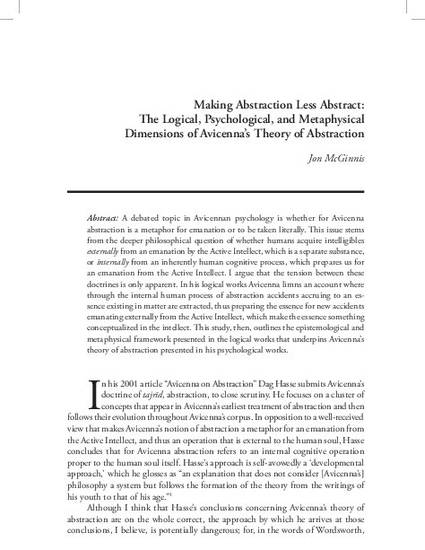
Article
Making Abstraction Less Abstract: The Logical, Psychological, and Metaphysical Dimensions of Avicenna’s Theory of Abstraction
Proceedings of the American Catholic Philosophical Association
(2007)
Abstract
A debated topic in Avicennan psychology is whether for Avicenna abstraction is a metaphor for emanation or to be taken literally. This issue stems from the deeper philosophical question of whether humans acquire intelligibles externally from an emanation by the Active Intellect, which is a separate substance, or internally from an inherently human cognitive process, which prepares us for an emanation from the Active Intellect. I argue that the tension between these doctrines is only apparent. In his logical works Avicenna limns an account where through the internal human process of abstraction accidents accruing to an essence existing in matter are extracted, thus preparing the essence for new accidents emanating externally from the Active Intellect, which make the essence something conceptualized in the intellect. This study, then, outlines the epistemological and metaphysical framework presented in the logical works that underpins Avicenna’s theory of abstraction presented in his psychological works.
Disciplines
Publication Date
2007
Citation Information
Jon McGinnis. "Making Abstraction Less Abstract: The Logical, Psychological, and Metaphysical Dimensions of Avicenna’s Theory of Abstraction" Proceedings of the American Catholic Philosophical Association Vol. 80 (2007) p. 169 - 183 Available at: http://works.bepress.com/jon-mcginnis/6/
